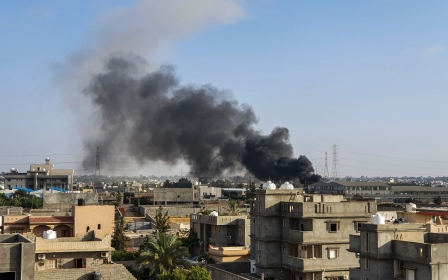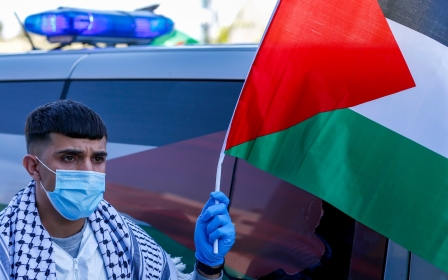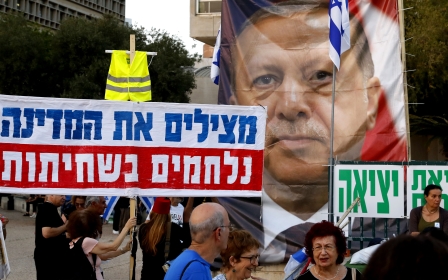Israel seeking to rebuild full diplomatic ties with Turkey
Israel's government is looking to re-establish full diplomatic relations with Turkey by jointly appointing ambassadors to each country, an Israeli official source told Middle East Eye, noting that the two have common interests such as Syria and natural gas supplies in the Eastern Mediterranean.
The comments came as Turkish social media users earlier this week hyped an unverified story which said Israel had proposed to sign a Mediterranean delimitation deal with Turkey, similar to one agreed with Libya last year disrupting Greek plans to squeeze Turkey into a tight corner.
Euphoria over a possible ease in the relationship followed a tweet posted by the official Israel account on Twitter that said Israel was proud of its diplomatic relations with Turkey and was hoping to grow the ties even stronger in the future.
That led many observers to point out that Israel was missing in a statement signed by its allies this week condemning Turkey for its “illegal activities” of gas drilling and “expansionism” in the Eastern Mediterranean. The statement was signed by the foreign ministers of Cyprus, Egypt, France, Greece and the UAE earlier this week.
“We have never discussed anything related to a maritime delimitation deal with Turkey, even in the heydays of bilateral relations in the '90s, the reports are complete nonsense,” the Israeli official told Middle East Eye.
“What we are looking for [now] is full diplomatic relations with Turkey. As long as we don’t have it, there is very little we can achieve together.”
The official said that Turkey has an ambassador in Greece despite the increased diplomatic tensions. “With UAE, Turkey has even more problems but there is a UAE ambassador in Ankara,” the official added.
Asked about the absence of Israel in the statement that condemned Ankara, the official said the country has never been part of that group. “We are only members of the Eastern Med Gas Forum, which is based in Cairo. That statement had two issues, one of them is Libya, whereas the saying goes, we have no dog in the fight,” the source said.
'The same Iranian proxy known as Hezbollah is challenging Turkey’s soldiers in Idlib, and it is challenging our soldiers in southern Syria. This is a common topic of interest, as well as energy'
- Israeli official
Turkey and Israel haven't had ambassadors in their respective capitals since the US moved its embassy from Tel Aviv to Jerusalem in May 2018, resulting in mass Palestinian protests.
After scores of Palestinians were killed by Israeli forces along the Gaza-Israel frontier, Turkey asked Israel's ambassador to temporarily leave the country and recalled its own envoy.
The Israeli official said Syria was among the chief reasons that relations should be normalised.
“The same Iranian proxy known as Hezbollah is challenging Turkey’s soldiers in Idlib, and it is challenging our soldiers in southern Syria. This is a common topic of interest, as well as energy,” the official said, adding that Ankara and Israel were close to a deal that would have brought Israeli gas to Turkey before relations broke down.
Israel helped Turkey earlier this month deliver a shipment of medical aid to the occupied West Bank and the besieged Gaza Strip, as Ankara granted export permission for medical equipment purchased by Israeli hospitals against the coronavirus.
However, a detente in the relations has not seemed likely since Israeli Prime Minister Benjamin Netanyahu, whose relations with Turkish President Recep Tayyip Erdogan are notoriously poor, succeeded in forming a government after three elections in a year.
Turkey had hoped a government led by Netanyahu's rival Benny Gantz could have led to reconciliation. Instead, a coalition government set to be sworn in this week will likely pursue annexation of parts of the West Bank, a move already severely criticised by Turkey last month.
This article is available in French on Middle East Eye French edition.
Middle East Eye propose une couverture et une analyse indépendantes et incomparables du Moyen-Orient, de l’Afrique du Nord et d’autres régions du monde. Pour en savoir plus sur la reprise de ce contenu et les frais qui s’appliquent, veuillez remplir ce formulaire [en anglais]. Pour en savoir plus sur MEE, cliquez ici [en anglais].




